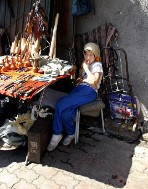|
Racism dividing China's
wild west pervades
Thu Sep 23, 2004 12:02 AM ET
 By
John Ruwitch By
John Ruwitch
URUMQI, China (Reuters) - The lights dim, Turkic music
fills the air and smiling ethnic Uighur dancers wind
onto the stage -- women in sequinned belly-dancing
outfits and men in baggy trousers with boots and skull
caps.
The audience of 400 -- most of them visitors from
China's ethnic Han majority -- snap pictures as they
enjoy the show at long tables laden with pitchers of
beer.
But a darker subtext underlies the performance at the
elaborate banquet hall in the Muslim-themed
International Grand Bazaar in Urumqi, capital of
China's western Xinjiang region.
Turkic-speaking, Muslim Uighurs and the ruling Han
Chinese may live side by side in Urumqi but signs are
that they are far from equal.
The bazaar, built last year by the city government, is
replete with faux minarets, a tightrope walker,
tourist shops selling knives and rugs, a camel for
photo opportunities, a Kentucky Fried Chicken outlet
and a liquor store.
"It's got a special ethnic feel. You know, ethnic
unity -- it's very good," said a Han visitor from
far-off central Henan province who gave his family
name as Zhou.
Uighur cook Ali, carving ribs out of a roast goat for
the buffet, said it all made him feel uneasy.
"It's using our culture for economic gain," he said.
The comments reflect widely differing ideas about
progress in Xinjiang, a vast desert and mountain
region where a collision of cultures is exacerbated by
interventionist state economic plans and a crackdown
on what Beijing calls separatism and terrorism.
SUBTLE AND OVERT RACISM
The gulf stems from Xinjiang's history
The region was formally incorporated into China in
1884, though it saw a brief period of virtual
independence from 1938 when it sought aid from the
Soviet Union. China regained control after the
Communist Party seized power in 1949.
Many Uighurs resent what they see as inequalities
under Han rule. Separatist groups have been fighting
for the past 150 years for an independent East
Turkestan homeland, claiming a region they have
inhabited for more than 1,250 years.
For Beijing, the prospect is unthinkable, in large
part because if Xinjiang were granted independence or
more autonomy, Tibet and Taiwan would surely try to
follow.
So the government has treated dissenters harshly,
particularly in the wake of the Sept. 11, 2001,
attacks on the United States carried out by Islamic
militants.
Rights groups accuse China of using the U.S.-led war
on terror as a pretext for an indiscriminate crackdown
on Uighurs.
The government denies the accusations and says no
racial problem exists in Xinjiang.
Uighur university student Maimaijiang says
pronouncements of racial harmony and equality are
false.
"You can't say there isn't a problem any more. There
is," he said as he waited for a haircut in Urumqi's
Muslim quarter.
"It's less and less equal ... In a fight between a Han
and a Uighur, definitely the Han will get the benefit
of the doubt. It's like this all over," he added.
Han Chinese receive better jobs with less education,
he said.
Beijing in recent years has pushed a plan to develop
the west, with Xinjiang as the focus, to help it catch
up with the fast-growing eastern seaboard.
As many as two million Hans moved in the 1990s to
catch the wave, giving Xinjiang the country's
fourth-highest migration rate behind the booming
province of Guangdong, the financial hub Shanghai and
the capital, Beijing, said Nicolas Becquelin of the
rights watchdog Human Rights in China
Uighurs account for about 40 percent of Xinjiang's
population, with Hans only slightly less. The rest are
from other minority groups.
Uighur culture is being trampled in the process,
critics say.
BETTER ECONOMIC PROSPECTS?
Still, many in Urumqi, even Uighurs, say the plan has
changed the landscape and cite a buzz about economic
prospects.
Mohammed, 18, is studying Mandarin Chinese and English
at Xinjiang's top university so he can go into
business like his father who has made a name for
himself shipping rice from China's northeast to the
Silk Road town of Kashgar.
"I hope to go into business. I hope to go abroad," he
said, reflecting the high hopes spawned by economic
change. Mohammed says Uighurs and Han generally get
along together.
Across the street from the International Grand Bazaar,
Maimainat, 33, and his younger brothers from the
predominantly Uighur south Xinjiang town of Hotan sell
scarves and belts on the street. He, too, is
optimistic.
"In the future I want a store like that," he said,
pointing at the shops in the Bazaar. "It can do
business by day, then we can do business like this at
night."
In Urumqi and in northern Xinjiang, Han Chinese and
Uighurs mix more than in the south, which is mostly
populated by Uighurs.
It is not clear that the "Go West" plan has led to
equal development. It is largely run by the Han and
has benefited them more than Uighurs or the other
ethnic minorities in Xinjiang, such as Kazakhs, Tajiks
and Hui Muslims, said Becquelin.
"The playing field is never level for Uighurs," said
Becquelin, a Xinjiang expert. The local population
does not feel a sense of engagement in the development
process and socio-economic disparities are widening,
he said.
"Overall, the Uighur population is losing out in this
development process," he said.
At a night market in the town of Hami, to Urumqi's
east, a Uighur shopowner blurts out his view for
future prospects.
"You want to know what the future's going to look like?
It's the Han rich and the Uighurs poor!"
© Reuters 2004. All Rights Reserved.
|



 By
John Ruwitch
By
John Ruwitch